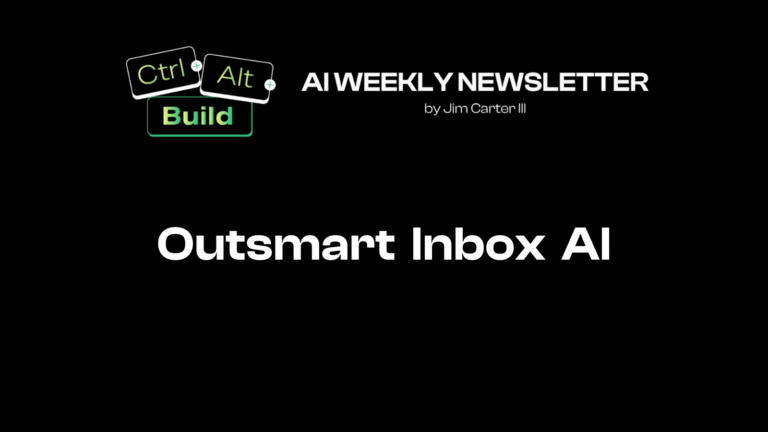🤖 How LLMs are Shaping the Future of Writing
Ever wondered how AI is changing the way we write? Let me share a story that’s been on my mind.
I was working on a complex proposal for a client.
Staring at a blank page, the sheer volume of information I needed to include felt overwhelming. That’s when I reminded myself I live in a world where I don’t have to get stuck in these situations anymore.
Gathering all the notes, sketches, PDFs and transcripts I was able to have an LLM write the summary, outline the important items, and even draft the email to get me started.
LLMs (Large Language Models) are the latest popular way to work with AI, and they’re not just for techies and early adopters anymore. They’re the engines driving some of the most advanced AI writing tools we use today. These models are trained on unfathomable amounts of data & that enables them to understand context, capture nuances, and generate human-like text.
But here’s what’s truly fascinating not many know yet: LLMs can be customized to match your unique voice. By fine-tuning these models with your own writing samples, the AI begins to mirror your style, tone, and preferences.
Think about the possibilities this unlocks for entrepreneurs, marketers, and creatives alike:
- Content Creation at Scale: Generate blogs, social media posts, or product descriptions in a fraction of the time.
- Enhanced Brainstorming: Use AI to explore new angles on topics you’re passionate about.
- Overcoming Writer’s Block: Jumpstart your writing process when you’re feeling stuck.
Inflection Point: How can we leverage LLMs to enhance our creativity without losing the human touch that makes our work unique?
I believe it’s about finding the balance. AI should be a tool that amplifies our abilities, not a crutch we rely on entirely.
It can handle the heavy lifting of initial drafts or mundane writing tasks, freeing up our time to focus on strategy, storytelling, and adding that personal touch.
And it’s accessible to all of us. Whether you’re a small business owner crafting a newsletter or a student writing a thesis, AI writing tools can be your not-so-secret secret weapon.
My Challenge for You: Next time you’re working on a writing project, try incorporating an AI tool powered by LLMs. Be open. Be curious. And observe how it transforms your process.
Remember, the goal isn’t to replace your voice but to enhance it.
– Jim’s learning corner 😎
P.S. if you’re looking for this, have a Podcast, and don’t know where to start, scroll to the bottom of this newsletter!
📝 Google’s NotebookLM: Your AI-First Notebook
Google just released something that’s changing how we interact with our notes and ideas.
Key Facts:
- 📚 Personalized AI Assistant: NotebookLM brings your documents together in an easy place to use AI with them.
- 🎙️ Audio Overviews: Generates podcast-like discussions based on your content. This is wild!
- 🚀 Boosts Productivity: Helps summarize, explain, and brainstorm ideas from your notes.
Imagine having a notebook that’s not just a place to jot down ideas but a dynamic assistant that helps you understand and expand them.
That’s what NotebookLM brings to the table.
I recently tested NotebookLM with one of my newsletters, and I was genuinely impressed. It didn’t just summarize my content; it created a lighthearted audio discussion between two AI hosts, that started with a crazy hook that had me in the first 5 seconds, and began to teach-back the content I wrote, dissecting and debating the points I’d made.
Here’s how it works:
- Upload a Google Doc or link websites/videos, and NotebookLM generates a concise summary, key topics, and even suggests questions to explore further.
- Need clarity on a concept? Just ask, and the AI provides insights grounded in your own notes.
- From drafting a video script to anticipating investor questions, NotebookLM assists in expanding your ideas.
But it’s the Audio Overviews feature that really caught my attention. It turns your notes into a podcast-style discussion, making it easier (and more entertaining) to revisit and internalize your ideas.
Important: While the technology is truly groundbreaking (I’ve never seen anything like this), it’s still important to fact-check the AI’s responses. The model relies on your input, so the accuracy of the output depends on the quality of the content you provide.
Try It Out: If you’re curious, you can access NotebookLM here: notebooklm.google.com 🔗
💧 AI Tackles Water Wastage by Detecting Leaky Pipes
Saving water with sound and AI—here’s how technology is addressing a critical global issue.
Key Facts:
- 🎧 Acoustic Sensors: AI uses sound to detect leaks in water pipes.
- 🌍 Global Impact: Significant reduction in water loss for utilities worldwide.
- 💡 Environmental Benefits: Conserves water and reduces water losses.
Water is one of our most precious resources.
However leaks in water distribution systems account for 30% to 70% of piped drinking water losses globally. That’s wild.
Enter FIDO Tech, a company using AI and acoustic sensors to combat leak detection. By listening to the unique sounds within pipes, their deep-learning AI can pinpoint leaks with impressive accuracy.
Here’s why this changes the industry.
Traditional methods might take days or weeks to identify a leak. FIDO’s AI does it in seconds. The AI doesn’t just find leaks; it ranks them by size, helping utilities focus on the most significant issues first. And sensors can be moved around easily, allowing for flexible monitoring of different network areas.
For example, EPCOR, a water utility in Arizona, reduced its non-revenue water from 27% to around 10% using FIDO’s technology.
That’s a massive saving, not just in water but in energy and cost.
Another Inflection Point: What other critical infrastructure challenges could we address by combining AI with innovative sensing technology?
It’s inspiring to see technology being applied for such impactful sustainability efforts. As entrepreneurs and business leaders, we can learn a lot from this approach—identifying real-world problems and applying advanced technology to create meaningful solutions.
🕶️ The Rise of AR Glasses: Will They Replace Smartphones?
Meta’s latest AR glasses are incredible, but are we ready for them?
Key Facts:
- 👓 Meta’s Orion Glasses: Touted as the most advanced AR glasses, integrating holographic displays.
- 📱 Smartphone Replacement?: Potential to become the primary mode of communication.
- 🤔 Challenges Ahead: Social acceptance, privacy concerns, and technological hurdles.
Close your eyes.
Think about stepping outside and putting on your sunglasses. But this time, they overlay digital content onto your real-world view, controlled by voice commands and hand gestures.
Open your eyes again (well, unless you’re reading this with your eyes closed – which would be seriously impressive), Meta’s new Orion AR glasses aim to make this a reality.
Mark Zuckerberg describes them as offering a “glimpse of the future,” where smart glasses could replace smartphones. While the technology is undeniably impressive, there are several factors to consider.
Benefits:
- Seamless Integration: Hands-free access to data and communication.
- Enhanced Collaboration: Overlaying information in real-time could transform remote work and learning.
- Natural Interaction: Voice commands and gestures make for intuitive control.
Challenges:
- Comfort and Usability: Can they be worn for extended periods without discomfort?
- Privacy and Social Acceptance: How do we address concerns about data security and the potential for constant surveillance?
- Technological Limitations: Battery life, display quality, and compatibility with prescription lenses.
Open Question: Would you trade your smartphone for AR glasses if it meant a more integrated digital experience, or do the potential downsides give you pause?
There’s also the psychological aspect. Just as smartphones have impacted our productivity and well-being—both positively and negatively—AR glasses will bring their own set of societal implications.
As someone deeply interested in how technology shapes our lives, and own a pair of the RayBan Meta’s (and love them), it’s both exciting and cautionary.
These advancements are a reminder that innovation isn’t just about what’s possible technologically but also about what’s acceptable and beneficial to us as individuals and communities.
💡 Did you know: I use AI to translate my show in eleven languages? 🔗



